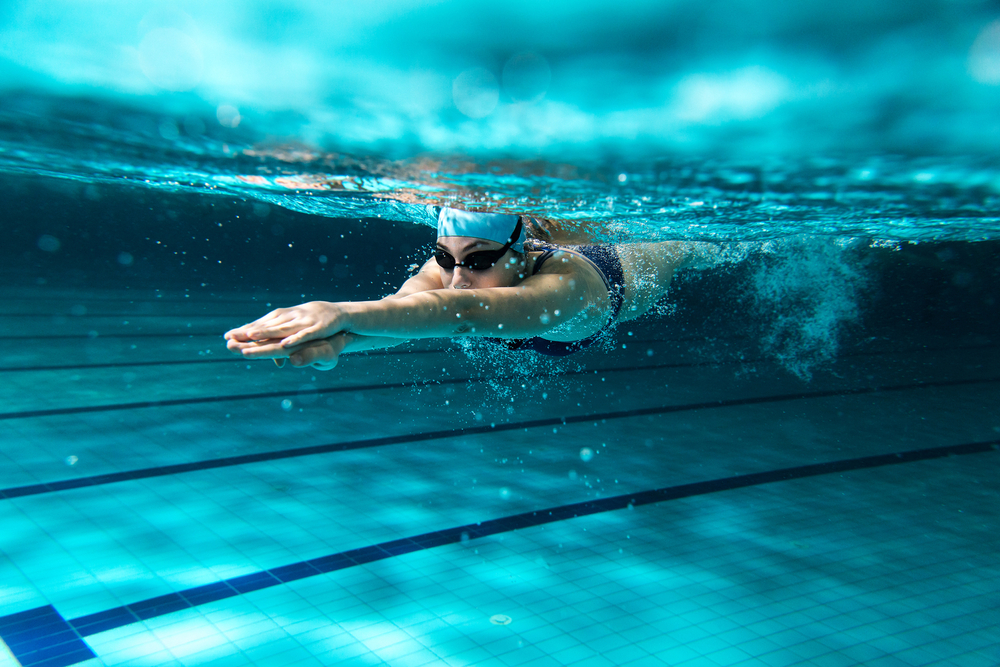Finding the Right Exercise Routine
Written by |

How should I exercise? Which activity is best for me to do? Those are always repeated questions when you have a chronic progressive disorder. I have Charcot-Marie-Tooth. I would like to lose weight and improve my overall health. However, it is not always easy when you are dealing with a chronic disorder that affects mobility and balance.
The right type and amount of exercise are extremely important. Exercise cannot restore muscles that are already damaged by CMT; it can only help maintain and strengthen the unaffected muscles. An article in CMT Association discusses how a physical therapist can help to design a program that is right for you. I am currently working with a physical therapist, and he is working to create a plan that works best for me.
I am also taking swimming lessons. It seems that swimming is good for CMT patients. I find that I have less joint pain after swimming than with other exercises. Learning to swim is harder than I imagined it would be. My biggest issue with freestyle swimming is coordinating the breathing, and arm and leg movements. I seem to have better coordination when doing the backstroke, maybe because I don’t have to think much about the breathing part.
Many articles talk about strength training and resistance exercises. An article on the Hereditary Neuropathy Foundation website recommends 150 minutes a week of aerobic exercise and activity. That breaks down to 30 minutes, five days a week, which seems doable until you factor in the impacts of CMT on daily life. I would like to go to the gym five days a week, but with work and other commitments, I am often too tired to go. I pay for the membership and feel guilty that I do not go as much as I should. I know that if I can get into a routine, I may be able to maintain it.
A friend suggested that I exercise in the morning before work to allow for the after-work fatigue. But I just can’t seem to get up and out of bed early enough to do this. I know I need to exercise to keep the strength I have. I also know I have to listen to my body.
Have you found that exercise helps? If so, which exercises do you do?
***
Note: Charcot-Marie-Tooth News is strictly a news and information website about the disease. It does not provide medical advice, diagnosis, or treatment. This content is not intended to be a substitute for professional medical advice, diagnosis, or treatment. Always seek the advice of your physician or other qualified health provider with any questions you may have regarding a medical condition. Never disregard professional medical advice or delay in seeking it because of something you have read on this website. The opinions expressed in this column are not those of Charcot-Marie-Tooth News or its parent company, Bionews Services, and are intended to spark discussion about issues pertaining to Charcot-Marie-Tooth.






Eric
The best exercise for you is the one you don't experience as some sort of torture. For me that was non-flow Yoga.
Yoga classes in general are likely not appropriate, but private yoga teachers are, as they can pay all their attention to you, something not possible in a 20 person class.
If Hereditary Neuropathy Foundation is recommending any sort of anything for your CMT without a familiarity with your personal case, this should be taken with a grain of salt.
And what constitutes "activity?" It may be that a person cannot get "aerobic," due to disability. 150 minutes is 2.5 hours... over and above living.
Jill Price
All very true. I know it is about what is right for me.
Jill Price
Good points, thanks.
Cyndi
I too have trouble coordinating my body well enough to effectively swim laps, so I do deep water jogging with a flotation belt. I am 52 and pretty severely affected by CMT2—I use a walker and wear AFOs, and before I started exercising 3.5 years ago, I was on the verge of needing a wheelchair full time. That prospect scared me enough that I committed to getting in the pool for 30 minutes five times a week. At first I was exhausted after 5 minutes, but was surprised to find that I quickly built strength in the non-affected parts of my body. After a few weeks, my mood was better, my fatigue lessened, and I just felt better.
I changed my diet as well, and slooowly weight started coming off. It took me over a year to lose 50 pounds but I have kept it off. I now exercise in the pool for an hour five times a week before work. I still have CMT, still need my walker, but I feel great. I'm stronger and fitter than I've been in 20 years and annoyed that I didn't start sooner.
It IS hard. It's hard to find the energy, the time, and the motivation, but it is so worth it. YOU are worth it.
Jill Price
So glad you found something that works for you! I am trying to find the right fit for me.
Jill Price
I am looking into changing my diet, as well. So glad that exercise helps you! I am hoping to get into a routine and see the benefits.
Sean
That is brilliant! Inspirational, we always do something to improve how we feel and the benefits cascade from just starting. Yay!
Team CMT
It is possible to build muscle strength with CMT. Research with CMT patients riding exercise bikes showed improvement in muscule strength. Exercise is highly individual. There are those with CMT that can barely walk to those that have done Iron Man competitions. Seeing a PT is a good idea. I also experience fatigue and find if I exercise the fatigue lessens quite a bit. The important thing is to listen to your body.
Jill Price
Thanks for the info. I know it is about finding what works for me.
Oliver De Battista
Very good information, thank you everyone. Oliver De Battista
Jill Price
Thanks!
John
Getting the right exercise can rev up your energy levels and even help your heart in the right way. The other muscles in your body benefit a lot from a suitable exercise routine. I agree with you; morning exercise is not for everyone. It is not only possible to build muscle strength with right amount and type of exercise, but it's also easy by using the right products of controlling body weight like this one https://www.cleverlivingtips.com/
Jill Price
Thanks for the info. I will look into it.
Zeynep KG
ı had an operation 20 and 8 months ago. and ı will be in operation 3 months later. ı am just 17 and ı cant going to the scholl. my surgeries were so hard. ı suffered a lot.
to strengthen my muscles I swim 3 or 4 days a week. ı dont know my cmt type cause
these tests are very expensive in my country. ı am waiting for my surgery. ı am hopeless for treatment. whatever
I just wanted to tell someone who understands me.
Jill Price
Sorry that this has been so rough on you. I hope swimming helps and gain your strength back. CMT is not an easy thing to deal with. I hope you get the help and support you need.
Vivienne
I don’t know what type of CMT I have. I am 50 years old and I started presenting with symptoms from age 6. I have had multiple surgeries of which some failed . Two years ago I had my ankles fully fused which actually helped a lot . In relation to exercise I became a Personal Trainer in my 30’s , i cycle on a spin bike quite fast once a week , I swim with hydro after once a week , I weight train 3 times a week and yoga 3 times a week . This regime works for me, I find that you have to know your limits and trying to fit all that in with work and family is challenging. Also do what is fun .